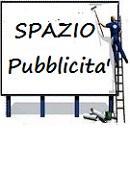The fact that Calabria still preserves a vast amount of its genuine popular traditions is essentially the result of its marginal geographical position and a rural and pastoral society.
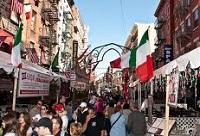 Although in the course of this century, Calabrians have come into contact with industrial and other worlds vastly different from their own (as a result of tourism and heavy emigration), they still cling firmly to their own traditions.
Although in the course of this century, Calabrians have come into contact with industrial and other worlds vastly different from their own (as a result of tourism and heavy emigration), they still cling firmly to their own traditions.
Emigrants to America, Australia and Canada have not infrequently formed whole villages, giving them the name of their birthplace, taking with them their distinctive religious celebrations, reviving customs and traditions thus keeping alive liturgies and festivities, as well their own cooking.
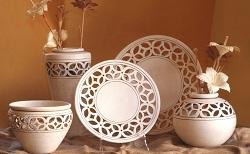 Even today, human relationships there are still modeled on the "old country".
Even today, human relationships there are still modeled on the "old country".
Great distances, animal husbandry using old fashioned ways in extremely isolated places, the naturally individualistic temperament of the people, the tendency and opportunity to observe nature, and its works, have all contributed to give Calabria a rich heritage of arts and craftsmanship not easily found elsewhere. It includes the vast range of shepherd's carvings, widespread spinning and weaving, and the various productions of wicker articles, terra cotta and ceramics.
Tradition has been enriched by the presence of ethnic and linguistic minorities of ancient origin (Grecian) and those of distant cultures (Waldensians and Albanians), not only thast of crafts but also its expression of dance choir and soloist singing, as well as forms of drama.
Observant sensitive visitors, especially from an industrial city, as well as the anthropologist, will find this vast panorama of culture and tradition of immense interest.
In recent years, there has been a drive to rediscover and appreciate local culture, a sort of new Humanism, which is providing for the conservation of works of art, crafts products, architecture, historic town centres, archeological finds and ancient documents that risk to be lost.
The leaders of this movement are Calabrians themselves, who realize that Calabria open to national and international tourism must show its authentic and most hidden face.
This given rise to a cultural movement which aims at presenting Calabrian culture as original and rural, and thus also classical.
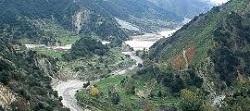 Calabrian popular tradition probably springs from a philosophy of life that is oriental in origin.
Calabrian popular tradition probably springs from a philosophy of life that is oriental in origin.
But then, is not most of Ionian Calabria already Eastern, especially there where traces of Byzantium still remain and where Greek is spoken?
The natural environment, too, influences the choice of life patterns and which influxes will be accepted; The long silent stony fiumare (small rivers), the deserted mountains, the boiling hot sun that parches, the ever-present sea and sun, a Spring that explodes in January, the never ending summer, atmosphere, heavy with scents and smells, often overpowering.
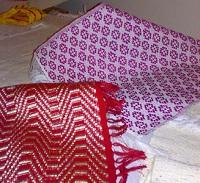 Here is formed a relationship with Nature, in which man is ever inferior to the grandeur of Creation, never separate from a Creating Force, evident also in pagan times.
Here is formed a relationship with Nature, in which man is ever inferior to the grandeur of Creation, never separate from a Creating Force, evident also in pagan times.
Artistic expression, generally spontaneous (with surprising resemblance between the human figures of the Calabrian distaffs and American and African totems), is enriched by external influences, such as the ever-present Byzantine, Greek, Arab and Spanish (diamond and palm designs are often used in weaving, and Spanish tradition dominates the Good Friday processions).
The Folklore Museum at Palmi and the Museum of Popular Art at Monterosso Calabro provide an exhaustive selection of the evolution of thought in Calabria, expressed through craftsmanship.
New dimensions of Agricolture : Agriculture, the true bond between Calabria and its inhabitants, is suspended between tradition and progress. Calabria still clings up to the values of genuine rural culture, which surfaces in its folklore, cooking and way of life.
The region however, far from betraying its origins, has undertaken radical agricultural change, with small holding being replaced by modern technological-advanced farms.
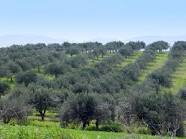 The flight from the countryside has yet not led to arable land being left to weeds, but has resulted in the development of more advanced farming methods.
The flight from the countryside has yet not led to arable land being left to weeds, but has resulted in the development of more advanced farming methods.
Calabria is now the 2nd Italian leading producer of olive oil (after Puglia) Rossano, in particular, produces a top quality oil with very low acidity. Olives are extensively grown on the Rosarno mountains and plains, but the large trees there produces a more acid oil.
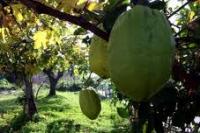 Another primary agricultural product is the citrus fruit, turning large stretches of country, such as the Sibari Plain, into a sea of green.
Another primary agricultural product is the citrus fruit, turning large stretches of country, such as the Sibari Plain, into a sea of green.
The climate is suitable for citrus, and an early variety of mandarin is cultivated. the clementine, which sometimes ripen from the beginning of October onwards.
Pale-skinned oranges are also widely grown. Other fruits trees are also cultivated, especially peaches for mixed use (processing and sale as fresh fruits), and the production of processed white figs has also been launched.
Horticulture flourishes here like floriculture, especially ornamental plants.
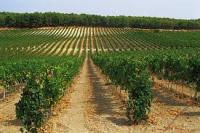 Wines and vines have already been discussed and we need only add that many thousands hectares of vineyards are cultivated with vines dating back to the times of the Greek settlers.
Wines and vines have already been discussed and we need only add that many thousands hectares of vineyards are cultivated with vines dating back to the times of the Greek settlers.
Each kind of vine produces a quite distinctive wine ranging from the white greco dessert wine to the full-bodied reds for drinking with roast meat.
A great effort is being made to replant trees, and extensive reforestation is being carried out at heights over 700m, and windbreaks are being planted along the coast, some up to 200m in width.
You might also be interested to learn about : Calabria Ethnic minorities | Calabria Grecanica | Traditions & Folklore | Costumes of Calabria | Traditions and Progress | A culture of skills | Art in Calabria | Archaelogy |

 Although in the course of this century, Calabrians have come into contact with industrial and other worlds vastly different from their own (as a result of tourism and heavy emigration), they still cling firmly to their own traditions.
Although in the course of this century, Calabrians have come into contact with industrial and other worlds vastly different from their own (as a result of tourism and heavy emigration), they still cling firmly to their own traditions.






